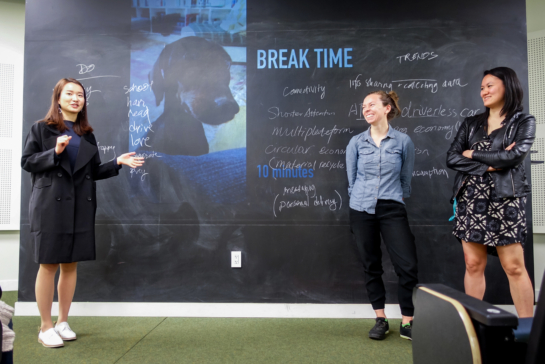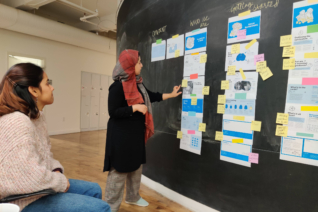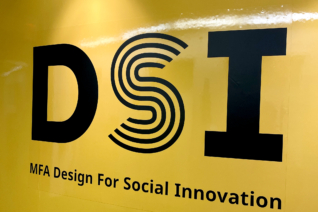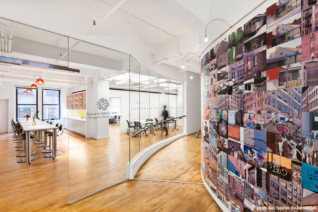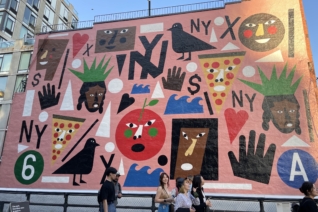Our Curriculum
The DSI curriculum is cross-disciplinary, systems-level, collaborative, and hands-on. Our coursework draws from within and outside the traditional design avenues to examine the complex systems that connect every major issue today. Students apply what they learn in projects, involving real clients and communities, to a self-designed Thesis project that caps the program.
First Year Fall Semester
SIG-5030
Fall semester: 3 credits
09/16/25– 12/9/25
Four (4) Tuesdays, 6:00 pm – 8:30 pm: 9/16/25; 10/14/25; 11/18/25; 11/25/25
Five (5) Saturdays, 10:00 am – 5:00 pm: 9/6/25; 10/4/25; 10/25/25; 11/8/25; 12/6/25
Instructors: Michelina Ferrara, Lorena Estrella
Location: DSI Open Room
This course explores the skills needed to be an active participant in social innovation, including change models, facilitation, relationships, team building and leaning into uncertainty. Structured as part lab and part discussion, students will complete readings, journal assignments and activities related to interaction, dialogue, capturing and observing data, writing research and facilitation plans, and developing relationships. At the end of the course, each student facilitates a group discussion with representatives from various parts of a system, aiming to help the group view the system from multiple vantage points and shift to a collective intention to prototype new solutions.
SIG-5360
Fall Semester: 1 credit
10/27/25 – 12/15/25 (8 sessions)
Mondays, 6:00 – 8:00 pm EST
Instructor: Tara Maurice
Location: DSI Classroom
In this course, students use systems thinking and creativity to explore the intersection of sustainability and design, including discussions on economics, ethics and quality-of-life indicators, how to distinguish problems from symptoms and unpacking the operating principles for life on Earth.
SIG-5350
Fall semester: 3 credits
Wednesdays, 09/03/25– 12/10/25
1:00 – 4:00 pm EST
Instructor: Mari Nakano
Location: DSI Classroom
Holiday Note: This class does meet on Wednesday, November 27 (Thanksgiving week).
Students explore how to meaningfully connect context and community-centered insights to strategies for innovation and social change. This hands-on course examines processes, thinking and practices of participatory/design research and co-creation approaches. Students investigate the role of storytelling and analysis/synthesis to discover needs, reduce harm and increase equity through collaboration with communities via self-driven group projects. Guest instructors share examples of exciting and emergent methodologies.
SIG-5220
Fall semester: 3 credits
Wednesday, 9/03/25 – 12/10/25
6:00 – 9:00 pm EST
NOTE: This class meets on Wednesday, Nov. 27 (before Thanksgiving holiday).
Instructors: Miya Osaki, Amanda Ramos
Location: DSI Auditorium
This series introduces students to the journeys of some of the most significant and inspiring individuals and organizations driving social innovation and making a positive impact in the world today. Guest speakers inspire new thinking and dialogue on various career opportunities in social innovation and the role design plays in each of them. Students practice facilitation skills and synthesize key takeaways to explore current themes. Guest practitioners provide feedback on students’ personal statements and design portfolios.
SIG-5170
Fall Semester: 1 credit (3 sessions)
Fridays, 10/17/25; 10/31/25; 11/21/25
11:00 – 5:00pm EST
Instructor: Lee-Sean Huang
Location: DSI Open Room
In this making course, students will explore a range of methods and techniques for taking a concept to completion using design focusing on prototypes as a method of testing and learning. The final project is designing and prototyping an AI-assisted future scenario for social good.
SIG-5150
Fall semester: 3 credits
Thursdays, 09/04/25 – 12/16/25
6:00 – 9:00 pm EST
Holiday Notice: No class on Thursday, November 27 in observance of Thanksgiving. Note the last class date is Tuesday, December 16 per the academic calendar to make up for the missed session.
Instructor: Sascha Mombartz
Location: DSI Classroom
The mapping and visualization of systems are addressed in this course in order to facilitate a journey from thinking to making. Readings, discussions and weekly “experiments” are employed to investigate how mapping and modeling techniques can help develop sustainable frameworks of action. The course helps students visualize and articulate their thinking, consider ways of planning and communicating solutions and develop new models of engagement and action. Students will participate in demonstrations with visiting guests.
First Year Spring Semester
SIG-5390
Spring semester: 3 credits
Thursday, 1/15/26 – 4/30/26
6:00 – 9:00 pm EST
Instructors: Stephanie Stavropoulos and John Stavropoulos
Location: DSI Classroom
Games designed to address social and political issues are one of the fastest-growing categories in the “serious games” movement. This course incorporates game theory and analysis with hands-on development of social impact games: interactive experiences that integrate sociopolitical events, values and messages into their design and game mechanics. Working in teams, students take on game projects from concept to functional prototype and refine them through several iterations, culminating in presentations and play with expert practitioners.
SIG-5410
Spring semester: 2 credits
Thursdays, 2/19; 3/19; 4/16
Fridays, 2/20; 3/20; 4/17
11:00 am – 4:00 pm EST
Instructor: Lee-Sean Huang
Location: DSI Open Room
As a continuation of SIG-5170, Technologies for Designing Change I, this course explores a range of methods and techniques for taking a concept to completion using design, artificial intelligence (AI) and machine learning to explore how these technologies may be applied to global issues. Creative experiments with generative AI will be conducted. This learning will support the systematic design decisions that determine the quality, impact and outcome of social design.
SIG-5070
Spring semester: 3 credits
Tuesday, 1/12/2026 – 4/28/2025
1:00 – 4:00 pm EST
Instructors: Miya Osaki, Corwin Green
Location: DSI Classroom
In this course students use language and verbal and visual communication skills to engage, persuade and shift social engagement through story writing and telling, cogent logic and public presentations. Throughout the semester, students develop a personal voice as well as collaborate with real-world community partners, clients and organizations to design communications as a system with intentional impact on outcomes. The course culminates with presentations to outside partners/clients and community collaborators.
SIG-5225
Spring semester: 3 credits
Wednesday, 1/14/2026 – 4/29/2026
6:00 – 9:00 pm EST
Instructors: Miya Osaki, Amanda Ramos
Location: DSI Auditorium
This series introduces students to the journeys of some of the most significant and inspiring individuals and organizations driving social innovation and making a positive impact in the world today. Guest speakers inspire new thinking and dialogue on various career opportunities in social innovation and the role design plays in each of them. Students practice facilitation skills and synthesize key takeaways to explore current themes. Guest practitioners provide feedback on students’ personal statements and design portfolios.
SIG-5440
Spring semester: 3 credits
Mondays, 1/12/26 – 5/4/26
6:00 – 9:00 pm EST
Instructors: Alison Cornyn
Location: DSI Classroom
Exercises in problem definition, audience identification, research and barriers to change will help students test their hypotheses for their thesis projects. In this course students investigate a variety of social issues, researching each to the point of confirming their own interest and the viability of their thesis topic. Criteria include demonstration of audience need, a clear articulation of a thesis topic and social issue, and metrics for success. By the end of the semester, students will have a fully vetted topic for their thesis.
Second Year Fall Semester
SIG-6190
Fall semester: 3 credits
Monday, 09/09/25 – 12/16/25
5:00 – 8:00 pm EST
Instructors: Mari Nakano, Kara Meyer, Sahar Ghaheri, Lona Vincent
Location: DSI Auditorium
In this course students conduct research to develop a thorough understanding of the social issue, audience needs, historical context, current landscape, and challenges of their thesis topic. Students design and implement a series of prototypes to test and refine their theories, and creating compelling presentations that bring each project vision to life through words, images, and measurable interventions. There will be a series of gate presentations to the thesis advisory board for approval of key milestones. Thesis advisors will also be available to provide guidance and feedback to students.
SIG-6170
Fall semester: 3 credits
Tuesdays, 9/02/25 – 12/9/25
6:00 – 9:00 pm EST
Instructor: Kira McDonald
Location: DSI Classroom
This course focuses on data and visualization for exploration—asking useful questions and engaging in purposeful discovery. We will explore both the theory and practice of gathering and visualizing data by integrating the identification of metrics into ongoing student projects, as well as evaluating metrics from case studies to understand strategy. Guest lecturers include data scientists, business and organizational leaders, and experts in social impact.
SIG-6220
Fall semester: 3 credits
Wednesday, 9/03/25 – 12/10/25
6:00 – 9:00 pm EST
NOTE: This class meets on Wednesday, Nov. 27 (before Thanksgiving holiday).
Instructors: Miya Osaki, Amanda Ramos
Location: DSI Auditorium
This series introduces students to the journeys of some of the most significant and inspiring individuals and organizations driving social innovation and making a positive impact in the world today. Guest speakers inspire new thinking and dialogue on various career opportunities in social innovation and the role design plays in each of them. Students practice facilitation skills and synthesize key takeaways to explore current themes. Guest practitioners provide feedback on students’ personal statements and design portfolios.
SIG-6180
Fall semester: 3 credits
Fridays, 09/05/25 – 12/17/25
11:00 am – 2:00 pm EST
Leadership Lab Days: TBD. Please note Lab Days are subject to change.
Holiday Notice: Class is canceled, Friday, November 28 in observance of Thanksgiving. Please note, the final class ends on Wednesday, December 17 to make up for the missed session.
Instructor: Karen Proctor
Location: DSI Auditorium (or Zoom will be provided by Karen)
This course will examine key leadership theories and practices, with the aim of enabling students to discover their leadership identity and apply their new knowledge and understanding in positive social change contexts. Through in-class discussion, case studies and leadership development process documentation, students will engage in intensive, reflective experiences that have been designed to transform leadership notions into knowledge. The course helps students to consider the “why” of their DSI journey from a leadership lens.
SIG-6185
Fall semester: 3 credits
Thursdays, 09/04/25 – 12/16/25
6:00 – 9:00 pm EST
Holiday Notice — No class on Thursday, November 27 in observance of Thanksgiving. Please note the last class date is a Tuesday (12/16/25) to make up for the missed session.
Instructor: Kobla Asamoah
Location: DSI Auditorium
The business language, models and concepts needed for real-world venture success are explored in this course. Students will gain practical knowledge and hands-on experience in the key business building blocks needed to execute a successful enterprise that is viable, financially sustainable and scalable. Thesis projects may be developed as start-ups. Students will also have the opportunity to present their business concepts to a panel of reviewers.
Second Year Spring Semester
SIG-6940
Spring semester: 6 credits
Monday, 1/12/26 – 5/5/26
6:00 – 9:00 pm EST
Instructors: Mari Nakano, Kara Meyer, Sahar Ghaheri, Lona Vincent
Location: DSI Auditorium
Students will share their thesis topics, interventions and theories for social change by presenting at key milestones. Guided by thesis instructors and advisors, students will complete their thesis projects and develop interventions that are ready for implementation. Students write and design a Thesis Book to document their process, concepts and references. Thesis projects will be defended as a final requirement. A review committee consisting of the program chair, advisors, faculty and outside experts will critique thesis presentations at critical milestones during the semester. Following approval, students present their final thesis to a public audience.
SIG-6175
Spring semester: 3 credits
Tuesday, 1/13/26 – 4/28/26
6:00 – 9:00 pm EST
Instructor: Kira McDonald
Location: DSI Classroom
This is the continuation of SIG-6170, Metrics and Data Visualization I. In the spring semester, students will study data and visualization for explanation—how various tools and techniques help us communicate with and influence others. Guest lecturers include data scientists, business and organizational leaders, and experts in social impact.
SIG-5225
Spring semester: 3 credits
Tuesday, 1/14/2026 – 4/29/2026
6:00 – 9:00 pm EST
Instructors: Miya Osaki, Amanda Ramos
Location: DSI Auditorium
This series introduces students to the journeys of some of the most significant and inspiring individuals and organizations driving social innovation and making a positive impact in the world today. Guest speakers inspire new thinking and dialogue on various career opportunities in social innovation and the role design plays in each of them. Students practice facilitation skills and synthesize key takeaways to explore current themes. Guest practitioners provide feedback on students’ personal statements and design portfolios.
SIG-6182
Spring semester: 2 credits
Friday, 1/16/26 – 5/1/26
11:00 am – 2:00 pm EST
This continuation of SIG-6180 Leadership I, will explore case studies and leadership development process documentation. Students will engage in intensive, reflective experiences that have been designed to transform leadership notions into knowledge. The course helps students to consider the “why” of their DSI experience through a leadership lens.
SIG-6950
Spring semester: 1 credit
Mon, 1/12/26; Tue, 1/13/26
9:00 am – 5:00 pm
Fri, 2/27/26; Sat, 2/28/26
2:00 – 6:00 pm
Instructor: Anne LaFond, Reshma Trasi
Location: DSI Auditorium
Year 1 Introduction to M&E Workshop
Friday, 2/27/26 (10:00 am – 1:00 pm)
Monitoring is the routine process of collecting data and measuring progress toward program objectives; evaluation is the use of social research methods to systematically investigate a program’s effectiveness. This course is designed to complement the thesis process and will examine how to measure program effectiveness through monitoring and evaluation (M&E). Students will be guided in the development of a theory of change, their own measurement plan and data collection.
